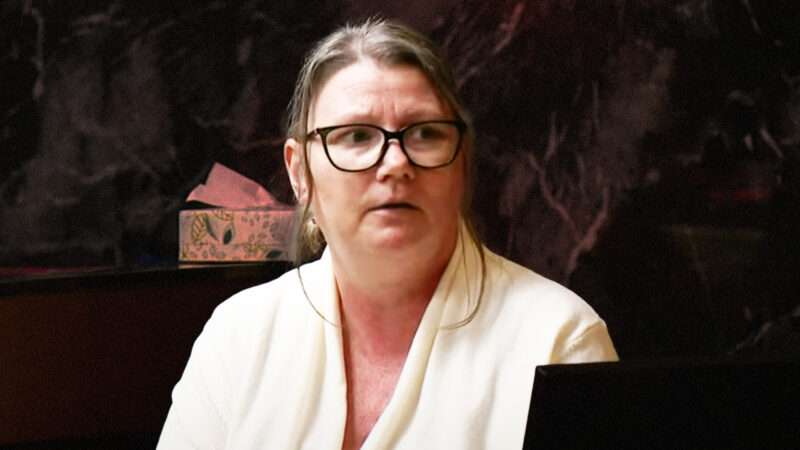
A jury on Tuesday convicted a Michigan woman on four counts of involuntary manslaughter in connection with the mass shooting her son executed at Oxford High School in November 2021. But while the defendant, Jennifer Crumbley, and her husband, James Crumbley, have been the subject of widespread scorn, her novel prosecution and his upcoming trial have raised questions about how far the state can reach to hold parents accountable for the actions of their children and what kind of precedent that sets.
Here, the prosecution posited the Crumbleys bore criminal responsibility for the murders committed by their son, Ethan, because they allegedly disregarded signs he was depressed and gifted him a gun for Christmas. But the evidence presented at trial painted a more complicated narrative. In some sense, the overall case seemed to hinge on what prosecutors wished the law said, not on what it actually says.
James Crumbley's trial is set for March; Jennifer Crumbley's sentencing will take place in April. They both face up to 60 years in prison.
Core to the state's case during Jennifer Crumbley's proceeding was the notion that Ethan had shown himself to be emotionally disturbed, and, instead of intervening, she left him to his own devices. Much was made of her extramarital affair and her devotion to her equestrian hobby; prosecutors wanted the jury to believe, one assumes, that she was more interested in riding horses and having sex with a man who wasn't her husband than she was in parenting her child.
But while she very well may have been a flawed parent—few serious people would argue adultery is a stand-up choice—testimony at trial made it far from clear that her son's murderous streak was predictable, much less that she "willfully disregard[ed]" it and could have prevented it via "ordinary care," the standard required by Michigan statute.
The state said Ethan told his mom via text that their house might be haunted; she testified he thought he was joking. More damning was a journal entry furnished by prosecutors where Ethan drew pictures of guns and wrote that "my parents won't listen to me about help or a therapist." Jennifer Crumbley, however, countered she was surprised to hear that, as she claims Ethan had not told her about a desire for therapy, and that she did not read his diary entries.
She was not the only one who was apparently caught off guard by Ethan's internal struggles. "I didn't think he could possibly be the shooter," testified Kristy Gibson-Marshall, an Oxford High School assistant principal, as the act constituted what she believed was a radical departure from his character. "It seemed so odd that it would be him." Superintendent Tim Throne echoed that: "At no time did counselors believe the student might harm others based on his behavior, responses, and demeanor," he testified, "which appeared calm."
Of course, even more central to the case is the gun itself, a 9 mm SIG Sauer SP2022 pistol, which James Crumbley purchased the day after Thanksgiving as an early Christmas present. It would prove to be an utterly disastrous choice, as Ethan would go on to use it the following Tuesday to execute four of his peers.
And yet, despite the fraught subject matter, and the absolute tragedy of those deaths, Michigan law still appeared inept to apply to the Crumbley parents. Michigan lawmakers have had the opportunity to pass "child access prevention" legislation authorizing criminal charges against adults "who intentionally or carelessly give minors unsupervised access to guns," noted Reason's Jacob Sullum in 2021, but they have on multiple occasions rejected the idea. And while the state has since enacted a "secure storage" law pertaining to safely securing firearms, it was not on the books at the time of the murders.
The Crumbleys, for their part, reportedly enjoyed going to the gun range as a family activity.
On the day of the shooting, a teacher discovered a drawing Ethan had made. On it was a gun and the words, "The thoughts won't stop. Help me" and "Blood everywhere." The Crumbleys were immediately summoned to his school; Ethan said he was devising a video game. Both parents have been intensely criticized for letting their son go back to class after that meeting—a decision that was greenlit by the school as well—after which Ethan would go on to commit murder.
But a closer examination of those troubling facts, too, is more complicated than the state would have it seem: The Crumbleys had specifically been told that their son should not be left by himself, and Ethan had just expressed to Throne, the superintendent, that the thought of missing homework assignments depressed him. With hindsight, listening to him was obviously the wrong choice. But I can understand why it was made, as parents, whether weak or adept, are not clairvoyant.
One of the more contorted parts of this outcome, however, has more to do with how the state approached Ethan, who was prosecuted as an adult and who thus received the maximum sentence Michigan allows: life in prison without the possibility of parole. "There is a logical contradiction in the state declaring Ethan Crumbley an adult—with full responsibility for his crime—while prosecuting his parents for gross negligence in child care," writes Megan K. Stack in an essay for The New York Times. "Ethan Crumbley was a child, or he wasn't. He was responsible for his actions, or his parents were. Can the state argue both positions at once? Prosecutors insist they can."
They can, and they did. But their success says less about the intellectual coherence of that approach and more about our desire to address every awful injustice with prison, no matter how much it may defy logic.
The post Mom's Manslaughter Conviction for Her Son's School Shooting Sets a Dangerous Precedent appeared first on Reason.com.







